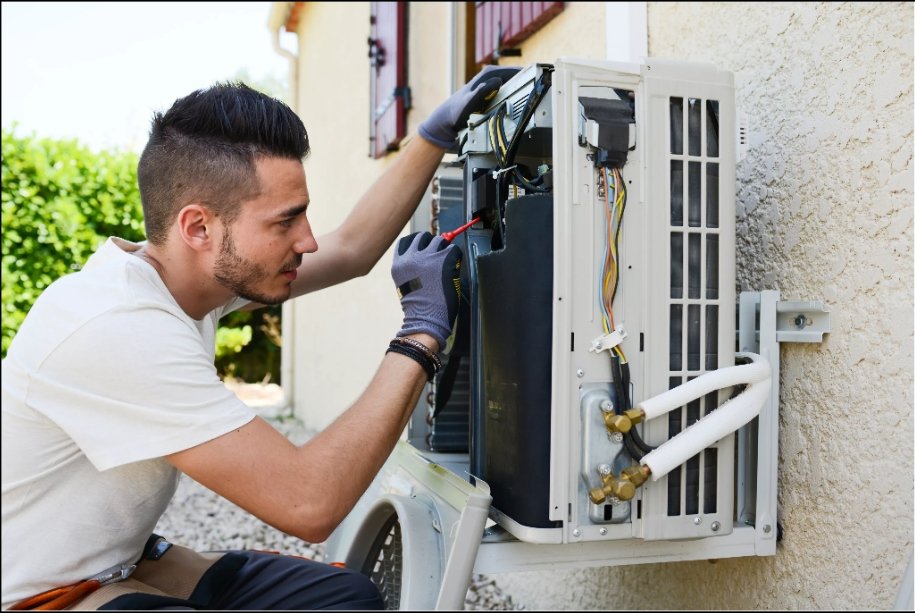
If your AC suddenly stops working, starts making loud noises, leaks water or refrigerant, or gives off burning smells, it’s time to call for emergency AC repair. These issues can damage your system or pose safety risks, especially during hot Massachusetts summers. This guide breaks down the warning signs, what counts as a true emergency, and how to get fast, reliable help when you need it most.
Understanding Emergency AC Repair
Emergency AC repair addresses system failures that threaten safety or comfort. Examples include refrigerant leaks that emit harmful gases or electrical malfunctions that risk fire. Unlike routine maintenance, like filter changes, emergencies require prompt professional attention. Recognizing these urgent scenarios is the first step to restoring reliable cooling.
Common Signs Requiring Emergency AC Repair
Several clear indicators suggest an immediate call to an HVAC technician:
- Complete loss of cooling
- Loud grinding, banging, or screeching noises
- Visible refrigerant or water leaks around the unit
- Burning or electrical odors coming from vents
- Frozen evaporator coils or condensate pan overflow
- Rapid on/off cycling (short cycling)
Each symptom points to a critical issue with components such as the compressor, condenser coil, thermostat, or air handler.
Emergency Indicators at a Glance
| Sign | Potential Issue | Emergency |
| No cold air | Compressor failure | Yes |
| Grinding or rattling noises | Motor bearings or fan problems | Yes |
| Sweet, chloroform odor | Refrigerant (coolant) leak | Yes |
| Ice buildup on coils | Airflow restriction or low refrigerant | Yes |
| Water pooling under unit | Drain blockage or leak | Yes |
Emergency Repair vs. Routine Maintenance
Emergency repair demands immediate action, often after hours. Routine maintenance is scheduled, preventive, and aims to optimize efficiency.
- Emergency AC Repair
- Triggered by system breakdowns
- Involves urgent diagnostics and part replacement
- Higher service fees for after-hours response
- Routine Tune-Ups
- Planned inspections and filter changes
- Seasonal coil cleaning and refrigerant checks
- Available under maintenance plans
To explore full offerings, including after-hours response, residents can visit AC repair services in Massachusetts.
Commercial AC Repair vs. Residential AC Repair
Commercial and residential systems differ in scale, complexity, and required expertise. Knowing which service to call prevents misdiagnosis and ensures effective solutions.
| Aspect | Residential AC Repair | Commercial AC Repair |
| System Size | Single-split or small packaged units | Large rooftop units, chillers, VRF systems |
| Cooling Capacity | Up to 5 tons | 5 tons and above |
| SEER Rating | 13–21 (typical) | 10–16 (industrial focus) |
| Response Time Needed | Within business hours or next day | 24/7 monitoring, emergency SLA commitments |
| Regulatory Compliance | Local building and energy codes | OSHA, factory standards, energy audits |
When to Call a Professional?
Acting quickly can prevent costly replacements and comfort loss. Homeowners and facility managers should call immediately if:
- Health and Safety Are at Risk Electrical arcing or refrigerant exposure can pose serious hazards.
- System Shutdown Complete unit failure on sweltering days demands an emergency call.
- Unusual Noises or Odors Signs of mechanical malfunction or electrical issues require expert evaluation.
- Rapid Cycling This stresses the compressor and raises utility bills.
Prompt service limits downtime and prevents minor glitches from escalating.
How to Choose a Qualified Technician?
Selecting a reliable HVAC contractor ensures safe and effective emergency AC repair. Key qualifications include:
- Proper licensing and insurance
- Proven experience with local Massachusetts codes
- 24/7 emergency availability
- Positive reviews and A+ Better Business Bureau rating
- Clear pricing and financing options
Final Thoughts
When your AC shows signs of failure, especially during peak Massachusetts heat, it’s critical to know when to act fast. Ignoring emergency warning signs can lead to bigger problems and higher repair costs. For peace of mind and rapid response when it matters most, trust the experienced team at Endless Energy to get your system back up and running safely.
(FAQs) Frequently Asked Questions
1. What qualifies as an AC emergency?
A true emergency includes complete loss of cooling on hot days, visible refrigerant leaks, electrical burning smells, or frozen coils that cannot be resolved by simple maintenance.
2. How much does emergency AC repair typically cost?
Emergency service fees vary by time and complexity. After-hours calls often incur higher rates, plus the cost of parts and labor.
3. Can a homeowner fix minor AC issues before the technician arrives?
Homeowners can turn off breakers, clear debris around the unit, and replace simple filters. Major repairs, especially involving refrigerant or electrical components, require licensed professionals.
4. How long can a frozen evaporator coil remain safe before a repair is needed?
A frozen coil should be addressed immediately. Running the system in this state can damage the compressor and void warranties.